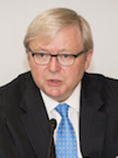
The United Nations is now seventy years old, but the world of seventy years ago was a vastly different place than the world of today. This raises the question: Does the UN remain “fit for purpose” to meet the current needs of the international community? And if not, what can be done in practical terms […]
Read more







